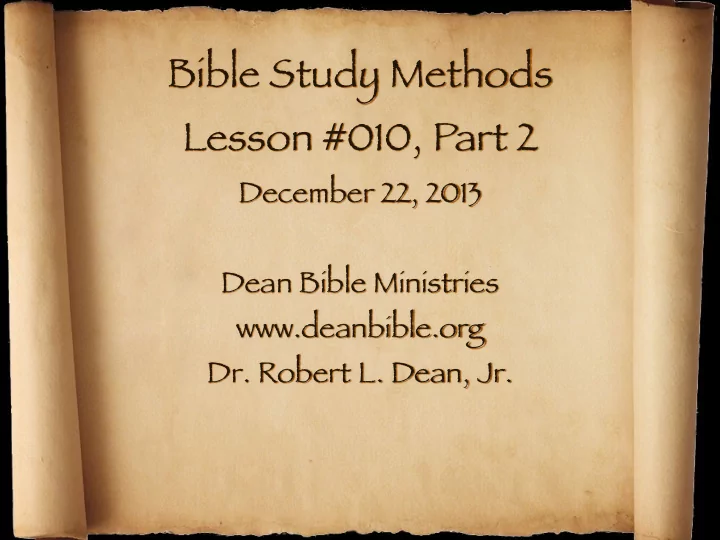

Bible Study Methods Lesson #010, Part 2 December 22, 2013 Dean Bible Ministries www.deanbible.org Dr. Robert L. Dean, Jr.
Allegory of Origen “tortured the Scripture” Scripture interprets Scripture “it is the first business of an interpreter to let his author say what he does say, instead of attributing to him what we think he John Calvin ought to say.” (1509–1564)
“all who say that the gospel is nothing without the approval of the church err and cast reproach upon God” Sixty-seven Theses “certainty comes from the power and clarity of the created activity of God and the Holy Spirit.” Ulrich Zwingli (1484–1531)
“Scripture has but one sense, which is the literal sense.”
“The infallible rule of interpretation of Scripture is the Scripture itself; and therefore when there is a question about the true and full sense of any Scripture (which is not manifold but one), it must be searched and known by other places that speak more clearly.” Westminster Confession of Faith (1647)
1. Scripture is to be interpreted like any other book. 2. The interpreter must give attention to words and expressions in the Scriptures. 3. The objective of the exegete is to determine the purpose of the author in the context. Jean-Alphonse Turretin (1648–1737)
4. The interpreter should use the natural light of reason (in this he followed his father, who followed Aquinas on the place of reason) and should see nothing contradictory in the Scriptures. 5. The “opinions of the sacred writers” must be understood in terms of their own times (i.e., the cultural and historical background should be Jean-Alphonse Turretin considered). (1648–1737)
• Importance of grammar in understanding the Scriptures, • He rejected allegorizing, • He emphasized a literal approach to the Bible. Institutio Interpretis Nove Testamenti (Principles of New Testament Interpretation) Johann Ernesti (1707–1781)
The Rise of Pietism and Mysticism Mysticism: Man has direct knowledge of God and His Word. Mysticism emphasized an inner spirituality, an inner light to truth. • Jakob Boehme (1575–1624) • Philipp Jakob Spener (1635–1705) • August H. Francke (1663–1727)
Father of Modern Liberalism Reaction to formalism and creedalism Key hermeneutic is subjectivism He rejected the authority of the Bible and emphasized the role of feeling and self- consciousness in religion. Friedrich D.E. Schleiermacher (1768–1834)
Father of Modern Existentialism • Relegated reason to the lowest level of human operation, • Rejected Christendom with its formal rationalism and cold creedalism, Søren Kierkegaard (1813–1855) • Taught that faith is a subjective experience in one’s moments of despair.
The Rise of Historical Criticism “The Bible is like any other book which means it is not supernatural, for it has ‘a complicated array of sources, redactors, and interpolaters’ which make it no different ‘from any other literary production’.” ~Benjamin Jowett F. C. Bauer and the Tubingen School, applied Hegelian principles. David Strauss, the Bible was a collection of myths, denied historical, grammatical interpretation, rejected miracles. Graf-Wellhausen and the Documentary Hypothesis.
Large Number of Conservatives in the 19 th Century E.W. Hengstenberg Carl F. Keil and Franz Delitzsch H.A.W. Meyer J.P. Lange Frederic Godet Henry Alford Charles J. Ellicott J.B. Lightfoot, B.F. Westcott, F.J.A. Hort Charles Hodge John Albert Broadus Theodor Zahn
Twentieth Century Trends Liberalism continued: The Bible is a human book; rejects the supernatural elements completely. Biblical orthodoxy: Literal, grammatical, historical hermeneutic. Neo-orthodox: Denied infallibility and inerrancy; the Bible becomes the Word of God when a person has a subjective encounter.
Summary Allegorical, which virtually denies the literal and can make the Bible mean anything; Rationalistic, which denies the supernatural; Subjective, which denies the objective meaning.
Recommend
More recommend